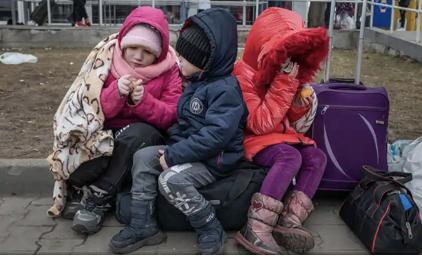A piece of paper. Yes, a piece of paper, the North Atlantic Treaty Organization (NATO) treaty, defines what the West does or doesn’t do to provide collective security. If you were an Estonian, 1 of 1.3 million people, you would be first in line to sign. Ukrainians wanted to sign up, but the prospect of provoking the Russians caused an invitation to be withheld. Well, we see where that got us.
Okay, I understand the real-politic at work, but what about Ukrainian children? Or another and another horrific assault on humanity? Is it enough to provide the Ukrainians with weapons and material support to the extent it can get through? Is it right to stand back because of threats from Vladimir Putin? How many vetos should he be given?
Just as Putin misjudged, NATO and its allies also misjudged. They too thought the war would be over quickly. But what we do know is that Russia’s plans failed and now it has turned to annihilation. What does the self-perceived humane world think about annihilation of a people? If you are Ukrainian and not under hour-to-hour threat from Russian artillery and missiles, it’s because you have become a refugee.
The humane world should understand Ukraine is its proxy. It has decided to stand and fight for the most fundamental values. I believe the humane world should push diplomacy more aggressively. Its message to Russia and Putin should be:
* If a ceasefire and acceptable pull back are not completed by April 1, then Volodymyr Zelenskyy will have a seat at the table in consideration or negotiations over economic sanctions. His voice, and it is a powerful one, will be influential.
* If an acceptable pull back is not achieved by April 1, there will be an offer to Ukraine to join NATO. If the war is about protecting fundamental values and the only way Ukraine can protect itself from Russia is to join NATO, the question should at least remain open.
* If an acceptable agreement is not reached by April 1, then American warships will join with NATO’s to keep the Sea Lanes open for Ukraine maritime uses.
* If an acceptable agreement is not reached by April 1, then NATO will enforce humanitarian zones and will do it with the latest in air defense weaponry, if necessary.
I should add that if NATO is worried about Russia using tactical nuclear or chemical weapons, we should also be worried about the nuclear energy plants in Ukraine and should be prepared to insulate them from harm’s way.
I am sure a range of foreign and security analysts can do a better job formulating the elements of a new diplomatic posture. But, simply stated, the world that considers its values to be humane must go on the diplomatic and, if necessary, protective offensive.
Red lines should also be more vividly stated. One could infer from the back and forth that the penalties for use of tactical nuclear weapons and/or chemical ones will draw a further sanctions decision. It should be understood that the devastation of Russian assets will be on the table.
It will be said this stance is too risky. My view: giving Putin an off-ramp that he can define both in time and conditions is a greater risk. As NATO stood back in 2014, he led the takeover of Crimea and the Donbas region of Ukraine. NATO’s inactions created the conditions the humane world now faces. Putin is said to be a hard-eyed realist. If that is the case he and those who allow him to lead Russia need to understand the hard realities when weighing costs and benefits.
Finally, I do not know if the Russian Orthodox Church is impervious to humanity’s rightful outrage, an outrage based on Russia’s defiance of God’s laws. If it is, then its position within the international religious councils should cease to exist.
Al Sikes is the former Chair of the Federal Communications Commission under George H.W. Bush. Al writes on themes from his book, Culture Leads Leaders Follow published by Koehler Books.



Write a Letter to the Editor on this Article
We encourage readers to offer their point of view on this article by submitting the following form. Editing is sometimes necessary and is done at the discretion of the editorial staff.